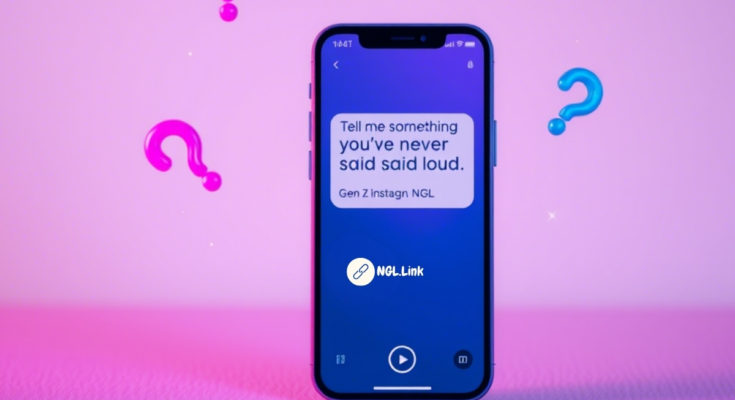It starts with a link.
Someone posted it on their Instagram Story with three simple words: “Send me something.”
No name. No context. Just a dare wrapped in digital mystery.
By midnight, their inbox is overflowing with confessions, compliments, callouts, and chaos. All anonymous. All irresistible.
Welcome to the world of NGL links, the anonymous Q&A trend Gen Z made viral again. But this isn’t just a phase. It’s a social experiment disguised as a game.
So what’s really going on behind the clicks?
Let’s unpack it.
What Are NGL Links and Why Do They Keep Showing Up in Stories?
NGL stands for Not Gonna Lie.
The app exploded on Instagram around 2022 and made a quiet comeback in 2024 faster, snarkier, and more TikTok-fluent than ever.
Here’s how it works:
- You generate a unique link using the NGL app
- You post it to your Insta Story or bio
- People can respond to it anonymously
No login. No names. Just raw, unfiltered messages.
Sometimes sweet. Often savage. Always addictive.
The thrill? You never know what’s coming.
Why Gen Z Keeps Clicking – Even When It Gets Messy
Anonymous messages aren’t new. But NGL links have tapped into something deeper. Especially for a generation raised on filters and feedback loops.
Let’s break down why they work.
1. It’s a safe way to ask for attention
You don’t have to say, “Please compliment me.”
You just posted a link. The internet does the rest.
It’s indirect validation. Disguised vulnerability.
And that makes it easier to participate.
2. Mystery equals engagement
Humans are wired for curiosity. And Gen Z? They grew up on “click to reveal.”
NGL messages turn social media into a guessing game.
Who said that? What do they mean? Was that about me?
It’s not just content. It’s a conversation with invisible rules.
3. Pressure-free expression
For the sender, anonymity removes risk.
No one’s tracking your typos, your tone, or your overthinking.
You can be bold. Or weird. Or wildly honest.
And that freedom? It’s rare and deeply attractive in a world of screenshot anxiety.
What Happens After the Click: Reactions, Screenshots, and Spiral Loops
Clicking is just the beginning.
The real drama unfolds in the replies.
One minute you’re posting “Send me honest thoughts.”
Next minute, you’re screenshotting a flame emoji with a caption: “Who is this?? 👀”
It’s a performative vulnerability, packaged as content.
And it works.
In fact, many creators now bait messages just for the content cycle:
- Post NGL link
- Receive anonymous chaos
- Share the juiciest ones
- React with humor, shock, or vague tears
It’s not just interaction. It’s a content format.
And that makes it repeatable.
But Is It Healthy? The Double-Edged Sword of Anonymous Messages
Every social trend comes with tradeoffs. NGL links are no exception.
Let’s look at both sides.
The good: A digital pressure release
For many teens, especially introverts, these messages unlock communication that might otherwise stay bottled.
A shy friend finally says “I admire you.”
A classmate apologizes.
A crush sends just enough hints to spark curiosity.
It’s therapy in meme form.
The bad: Anonymity attracts cruelty
Where there’s no name, there’s less accountability.
Hate, bullying, even emotional manipulation some users have seen it all.
That’s why tools like auto-filters, AI content moderation, and block controls matter more than ever.
Anonymity should offer freedom not a license to harm.
Beyond NGL: The Bigger Pattern Behind These Trends
NGL is just one node in a larger web.
Apps like SecretNote.me, Sendit, Tellonym, and even old-school ask.fm all reflect the same hunger:
People want to say things they’re scared to say out loud.
This trend isn’t really about technology. It’s about emotional architecture.
- Social media made us visible
- Anonymity made us honest
- Now, platforms are trying to combine both
It’s like trying to whisper secrets in a crowded theater. You don’t want everyone to know. Just the one person who gets it.
Should You Join the NGL Wave – or Stay Out of It?
That depends on what you want out of it.
Let’s explore your options.
Option 1: Use it to connect authentically
If your circle is kind, curious, and open-hearted NGL links can lead to real bonding moments.
You might learn what people admire in you. Or how you’ve impacted others without realizing.
The best part? It often comes from people you’d never expect.
Option 2: Use it for content and chaos
Some use NGL to stir the pot. And that’s fine too if you can handle it.
Just know the dopamine from anonymous praise fades fast. And criticism hits harder when you don’t know the source.
Option 3: Skip it and stay grounded
If you’ve been feeling digitally fragile or you already struggle with overthinking maybe sit this trend out.
You don’t need anonymous validation to be interesting.
Sometimes, peace > feedback.
Where It’s All Headed: The Rise of Anonymous Expression 2.0
Anonymity is evolving.
What started as Tumblr asks and Formspring confessions has now matured into smart, secure tools built for digital natives.
SecretNote.me, for example, isn’t just about sending anonymous notes. It’s about control.
- Your notes self-delete
- Your identity stays hidden
- Your message is encrypted, end to end
In other words: it’s playful and safe, not reckless.
As more people seek honest expression without the chaos, tools like this are stepping up. They turn anonymity into a creative tool, not just a social dare.
Final Thought: What NGL Links Really Teach Us About Online Life
At first glance, NGL is just a trend.
But look closer and it reveals a deeper truth:
People crave honesty but they fear judgment more.
Anonymity creates the distance we sometimes need to say what we actually mean.
But the real challenge?
Learning to carry that honesty into our visible lives.
Until then, we click. We wonder. We replied.
And we hope that somewhere behind that faceless message, someone meant every word.
Want to say something you can’t say out loud?
Try SecretNote.me. No account needed. Just your thoughts, encrypted and auto-deleted after reading.
Because some truths deserve to be said even if no one knows it was you.



